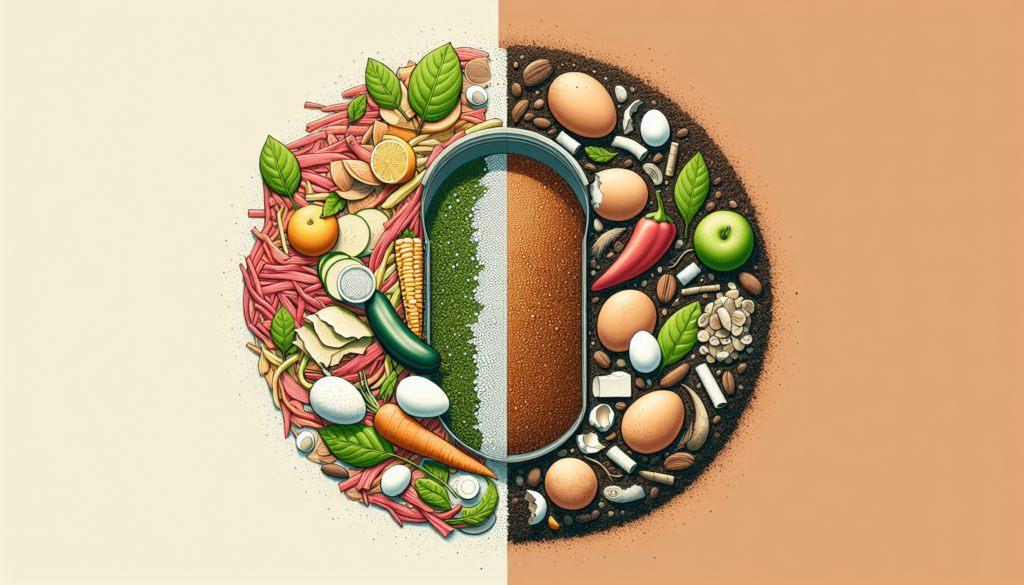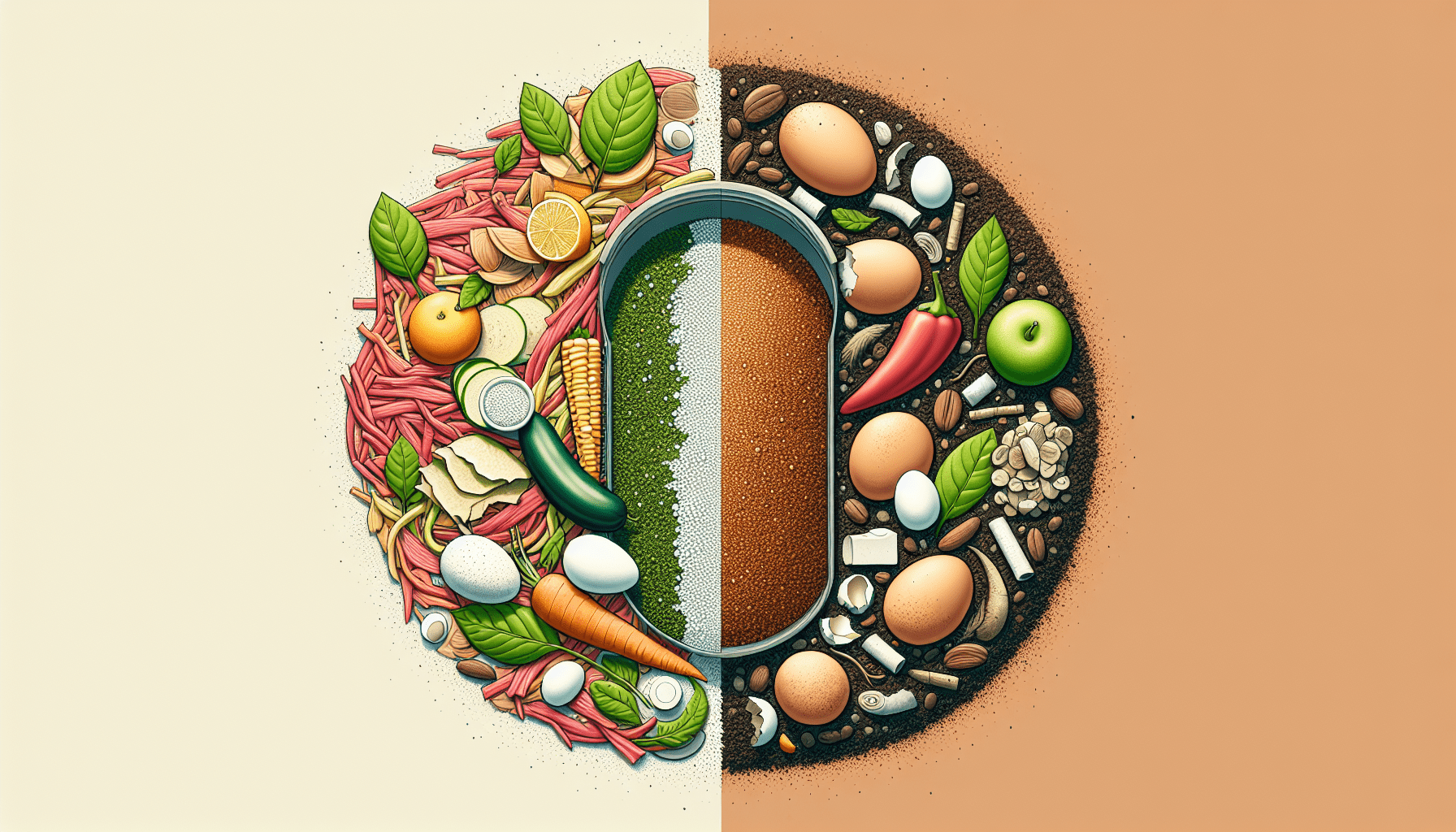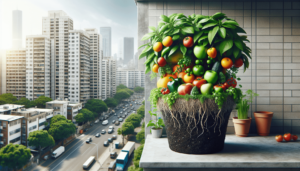Curious about the dissimilarities between compost and fertilizer? We’ve got you covered! In this article, we’ll embark on a journey to uncover the nuances between these two essential elements for healthy plant growth. Whether you’re an avid gardener or simply an inquisitive nature enthusiast, join us as we explore the distinct characteristics, benefits, and applications of compost and fertilizer. Let’s dig in!

Definition
Compost
Compost is a natural and organic material that is created through the process of decomposing various organic materials such as leaves, vegetable scraps, and grass clippings. It is a nutrient-rich substance that can be added to soil to improve its overall quality and fertility.
Fertilizer
Fertilizer, on the other hand, is a substance that is specifically designed to provide essential nutrients to plants. It can be either organic or inorganic and is generally manufactured and formulated with specific ratios of nutrients such as nitrogen, phosphorus, and potassium.
Composition
Compost
Compost is made up of a mixture of various organic materials that undergo decomposition. This mix typically includes items like food waste, yard waste, and other organic matter. Through a process called composting, microorganisms break down these materials, resulting in a dark, crumbly substance known as compost.
Fertilizer
Fertilizers are composed of specific nutrients that are needed by plants for healthy growth. These nutrients may include nitrogen (N), phosphorus (P), potassium (K), as well as other trace minerals. Depending on the type of fertilizer, these nutrients can be derived from both organic and inorganic sources.
Source
Compost
Compost can be produced from a variety of sources, including kitchen scraps like fruit and vegetable peels, coffee grounds, and eggshells. Yard waste such as grass clippings, leaves, and branches can also be used. Additionally, agricultural waste, such as crop residues and livestock manure, can contribute to the production of compost.
Fertilizer
Fertilizers can be derived from both natural and synthetic sources. Natural fertilizers are often produced from organic materials, such as animal manure, bone meal, or blood meal. Synthetic fertilizers, on the other hand, are typically manufactured through chemical processes that produce concentrated forms of nutrients.
Nutrient Content
Compost
Compost contains a balanced combination of organic matter, including essential nutrients like nitrogen, phosphorus, and potassium. While the nutrient content of compost may be lower compared to fertilizers, it provides a slow-release source of nutrients that are readily available to plants over time. Additionally, compost also contains beneficial microorganisms that contribute to soil health.
Fertilizer
Fertilizers are specifically formulated to provide plants with a concentrated dose of essential nutrients. Depending on the type and formulation, fertilizers can contain varying ratios of nitrogen, phosphorus, and potassium. These nutrients are often immediately available to plants, providing a quick boost to their growth and development.
Organic vs. Inorganic
Compost
Compost is considered to be an organic material since it is derived from natural sources. It does not contain any synthetic chemicals or additives, making it a preferred option for organic gardening and farming. The use of compost helps to build and enrich soil fertility while maintaining a natural balance in the ecosystem.
Fertilizer
Fertilizers can be either organic or inorganic. Organic fertilizers are derived from natural sources and typically contain plant or animal-based materials. Inorganic fertilizers, on the other hand, are synthetic products that are chemically manufactured. Both types of fertilizers have their advantages and disadvantages in terms of nutrient availability and environmental impact.
Release Rate
Compost
Compost acts as a slow-release fertilizer, gradually releasing nutrients into the soil over an extended period of time. This slow-release nature ensures that the nutrients are available to plants as they need them, reducing the risk of nutrient leaching or runoff. This slower release rate also helps to sustain soil health and promote the growth of beneficial soil organisms.
Fertilizer
Fertilizers can have both quick-release and slow-release formulations. Quick-release fertilizers provide an immediate supply of nutrients to plants, but they can also be prone to nutrient leaching and runoff. Slow-release fertilizers, on the other hand, release nutrients gradually over time, reducing the risk of nutrient loss. The choice of release rate depends on specific plant needs and environmental considerations.
Soil Health Benefits
Compost
Compost plays a vital role in improving soil health. It enhances the soil structure, allowing for better water retention and drainage. The organic matter in compost improves soil fertility by providing a steady supply of nutrients while promoting the growth of beneficial microorganisms. Compost also helps to prevent soil erosion, reduce soil compaction, and enhance overall soil biodiversity.
Fertilizer
Fertilizers provide essential nutrients that can enhance plant growth and productivity. The targeted nutrient supply helps address specific nutrient deficiencies, thereby improving crop yields. However, excessive or improper use of fertilizers can lead to nutrient imbalances, soil degradation, and pollution of water bodies. It is essential to use fertilizers judiciously to minimize potential negative impacts on soil health.
Environmental Impact
Compost
Compost is environmentally friendly and sustainable. It reduces the amount of organic waste sent to landfills and helps mitigate greenhouse gas emissions. The use of compost improves soil quality and reduces the need for synthetic fertilizers, pesticides, and herbicides, thus minimizing their potential negative impacts on the environment.
Fertilizer
The environmental impact of fertilizers depends on their composition, application rates, and management practices. Excessive use of fertilizers can lead to nutrient runoff, contaminating water sources and causing algal blooms. Inorganic fertilizers can also contribute to soil acidification and the depletion of beneficial soil microorganisms. The proper application and sustainable use of fertilizers are crucial to minimize their environmental footprint.
Application
Compost
Compost can be applied to the soil in various ways. It can be spread over the surface as a top dressing, incorporated into the soil during planting, or used as a mulch to retain moisture and suppress weeds. Compost can also be brewed into compost tea, which can be applied directly to plant foliage to enhance nutrient uptake and improve disease resistance.
Fertilizer
Fertilizers can be applied through various methods, such as broadcasting, banding, or side-dressing. Broadcasting involves spreading the fertilizer evenly over the soil surface, while banding concentrates the fertilizer in a narrow strip near plant roots. Side-dressing involves applying fertilizer alongside growing plants. The application method depends on the specific requirements of the plants and the type of fertilizer being used.
Cost
Compost
The cost of compost can vary depending on factors such as production methods, local availability, and market demand. Backyard composting can be a cost-effective option as it utilizes organic waste materials that would otherwise be discarded. However, commercially produced compost may incur additional costs associated with production, processing, and transportation.
What Is The Difference Between Compost And Fertilizer?
Fertilizer
The cost of fertilizers can vary widely depending on the formulation, brand, and nutrient content. Inorganic fertilizers are often more affordable compared to organic fertilizers. However, it is important to consider the long-term benefits and potential environmental impacts when evaluating the cost-effectiveness of fertilizers.
In conclusion, while both compost and fertilizer play important roles in enhancing plant growth and soil fertility, there are distinct differences between the two. Compost, derived from organic materials, provides a slow-release source of nutrients, improves soil health, and has environmental benefits. On the other hand, fertilizers, organic or inorganic, offer concentrated doses of essential nutrients that plants require for immediate growth. Understanding the characteristics, composition, and application methods of compost and fertilizers can help gardeners and farmers make informed decisions about which option best suits their specific needs and goals.




